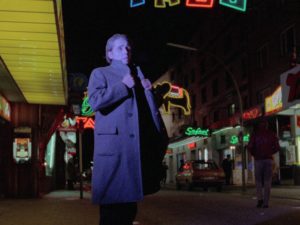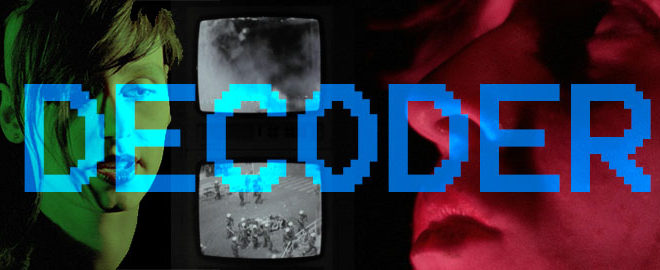It doesn’t get any more arty or punk than the singularly named Muscha’s Decoder from 1984 (read our review of Vinegar Syndrome’s 2k restoration Blu-ray of the film here). This West German film blends themes from George Orwell’s classic dystopian novel, 1984, and the writings of counterculture icon William S. Burroughs in a proto-cyberpunk milkshake laced with aggressively anticorporate messaging. Not for the faint of heart, this piece’s more repulsive moments may compel some viewers to discard it all together.

Industrial musician FM Einheit (Hunting the Zodiac 2003) plays a version of himself in Decoder, the disaffected audio artist FM. Disgusted by his peers’ willingness to participate in mainstream culture in the form of getting jobs at corporate/fascist burger chain, H Burger, he gets the idea of psychologically manipulating people whilst pondering the intentions of the fast food restaurant’s use of Muzak. Once he figures out a method to subvert the calming tendencies of the music, he starts leaving tape recorders that play his carefully concocted sonic disruptions at H Burger, McDonald’s, and Burger King locations throughout Hamburg. The resulting unrest and violent illness is captured on security footage, and so FM is noticed by the corporate illuminati comprised of H Burger’s upper management, Muzak manufacturers, and other menacing stuffed shirts.

This group commands their agent, Jaeger, played by New York avant-garde figure Bill Rice (Coffee and Cigarettes 2003), to track down the young dissident and eliminate him. Jaeger carries out his duties, even though he’s not particularly enthusiastic about it. The obviously exhausted assassin is also distracted by his obsession with peep show girl and avid frog collector Christiana (drug culture icon Christiane Felscherinow). Coincidentally, Christiana happens to be FM’s girlfriend, though their relationship is pretty rocky.

Eventually, FM’s activities lead to rioting in the streets as his squadron of noise pirates attempts to disrupt the societal status quo. Burroughs (Drugstore Cowboy 1989) appears in a cameo as the owner of a mechanical junk and repair shop. Pioneering industrial and performing artist Genesis P-Orridge of Throbbing Gristle fame also shows up as an underground techno priest.

First, a note on Decoder’s more shocking aspects. Early on when we first accompany Jaeger to the red light district, real stock footage of an autopsy, surgical castration, and some dude doing something with his dick and a shrunken head is shown. Additionally, I’m not absolutely certain that a scene with FM and some frogs constitutes animal cruelty, but it sure looks like it.

It’s unfortunate, because these scenes threaten to overwhelm the rest of Decoder, which is already quite potent. The creativity and artistic merit of the remainder of the work is, to me, unimpeachable and would still work without this genuinely upsetting imagery. Still, I understand that part of the filmmakers’ intent seems to be to shock viewers out of their culturally-induced complacency. However, sequences like the one in the arcade where violent gameplay is intercut with real combat footage—in an effort to show how we’re being conditioned by the dominant mass media to accept violence and war—is much more effective and requires no such grotesqueries.

Decoder isn’t the type of film where naturalistic acting is desired or required. That being said, Einheit is believable as an angsty and rebellious punk. Felscherinow (Neonstadt 1982) captivates, even as she allows frogs to crawl all over her. Rice delivers a most polished turn, and his world-weariness is a nice counterpoint to his costars’ more manic, youthful energy. Everybody looks great, too, with crust punk outfits and business suits embodying the film’s theme of cultural and generational conflict.

The Decoder script, written by Klaus Maeck (B-Movie: Lust and Sound in West Berlin 1979-1989 2015) and based on a story by Muscha (Humanes Toten 1980), Volker Schafer (Amelie 2001), Trini Trimpop, and Maeck, is light on traditional character development. It focuses on its message and feels more like an artistic thesis or satirical cultural dissection than a straight up narrative film. Heavily influenced by Burroughs’ famous cut up technique, meaning is meant to be derived through unconventional methods. Is Decoder sometimes impenetrably opaque? Sure, but it’s undeniably alluring.

The camerawork by Johanna Heer (Subway Riders 1981) is excellent. Shot composition is often beautiful, with characters being bathed in strange lighting ala Dario Argento’s Suspiria (check out our 2017 40th anniversary write up here). A stylish De Palma-esque tracking shot through a drab office building opens the film with aplomb. My favorite shots, though, are probably of the characters moving through the urban decay of early ‘80s Hamburg. The filmmakers also took to the streets of West Berlin during the riots that accompanied President Reagan’s visit in 1982 and incorporated that footage into the narrative.

Music is obviously a key component in Decoder. P-Orridge and Soft Cell’s David Ball curated the soundtrack/score, which includes tracks from Soft Cell, P-Orridge’s Psychic TV, Einheit’s Einsturzende Neubauten, and The The. The post-punk and industrial soundscape merges perfectly with the anxious Cold War atmosphere and arty visuals.

While it perfectly projects an early ‘80s sensibility, aspects of Muscha’s art punk Decoder seems eerily prescient (I’m thinking of Genesis P-Orridge’s improvised dialog about the nature of information and the portrayal of a surveillance state). I wish some of the creative choices designed to provoke the audience were omitted, and I wouldn’t blame those of you who object to such sequences, but the rest of the film is bizarrely brilliant. Decoder‘s critiques remain relevant and powerful. Recommended, with large caveats, to fans of Alphaville (Jean-Luc Godard 1965), Liquid Sky (Slava Tsukerman 1982), and Naked Lunch (David Cronenberg 1991).
 PopHorror Let's Get Scared
PopHorror Let's Get Scared




